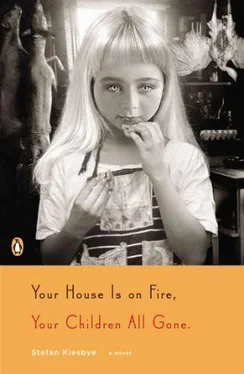What exactly happened inside I never learned. But when my father emerged again, his face was pale and without expression. He looked around as though he could find neither his truck nor me sitting by the window. For long seconds he stared into the sky, looked at the blooming hedges that surrounded the courtyard, and chewed on his dirty nails. Bruno von Kamphoff had fired him.
On our return that night, my mother first grew quiet after hearing the bad news, then implored my dad to tell her everything. We stood in the kitchen, our dinner was cooking on the hearth, but nobody thought about sitting down at the table. My father wouldn’t talk and just kept shaking his head. I filled in my mother, who listened impatiently, kneading her bunched-up apron. “The real heir,” she whispered again and again. When I was done, she had become so agitated that she disregarded my father’s sorrow, and said, “Erich, they can’t just fire you. Your silence must be worth something to them. They can’t just throw you away. You’ve helped them. They should pay you.”
I wouldn’t stop talking either and bombarded my father with questions. Was the stranger the real heir? Was he the long-lost brother, and where had he spent all these years? My mother stood behind me, with the hope that maybe this was our stroke of luck, that maybe we had found the key to more money, and maybe even a better house. She stood in the kitchen in her simple housedress and waited for an answer just as much as I did, maybe more. She didn’t stop me.
My father had never slapped me, and when he did it then, it seemed to do nothing to cool his rage. He wasn’t satisfied. Maybe he realized he had hit only his daughter, that he’d picked on the wrong person, but it didn’t matter anymore. The frustrations of all the years during which my mother had nagged and harassed him came pouring out, and he grabbed my hair and pulled me this way and that until he pushed my face into the glass door of our kitchen cabinet. He pulled me back, and my skin tore when he drove my face into the shards protruding from the wooden frame like broken teeth. I screamed, and my mother’s voice drowned out mine as she begged my father to stop, but he didn’t listen. He was at a loss for answers, for words, and how much better did his hand answer what his lips couldn’t.
The mill on the Droste stood north of Hemmersmoor. Fir trees made it hard to spot the hunched building until you were standing right in front of it, and Jens Jensen swore that on Walpurgisnacht, the mill went up in flames without being devoured, and devils and witches had a go at each other. “Martin,” he told me, “Martin, such nasty things you can’t even imagine.” Other rumors also made it worth our while to visit the Black Mill. It was said that the miller had lived in the same spot for over three hundred years. He’d lost his wife and six children, and no one remembered where his grave was located, or if he had ever died at all.
During the Thirty Years’ War, Swedish troops had used the mill’s mossy wheel to torture their prisoners and make them betray their compatriots and give up the secret locations of food and jewelry. They had also tortured and killed the miller’s family, and spared only the miller, badly cut and with a crack in his skull.
In another version of the miller’s story, young men masquerading as soldiers had assaulted the family and killed his apprentices. The miller knew the truth, though, and sought revenge. Half-dead, he had sold his soul to the devil and gained great powers, and whenever a village youth came to the mill, he was lured in by witchcraft and forced to work until his death. His apprentices had been spotted around Hemmersmoor in the shape of cattle or deer. The only way to kill them, the old people taught us, was to club them. Every third blow had to strike the ground, or else the witch or wizard would not die.
In the summers we reenacted the war, and we strapped prisoners to the wheel and made them ride high into the air and downward into the Droste’s dark waters. If you knew how to hold your breath, it wasn’t too dangerous to ride the wheel, but playing prisoner was nevertheless a punishment. After four or five full turns of the wheel, you’d beg to be released and were all too happy to show the Swedes where you’d hidden ham, bread, and your young daughters.
At first we went quietly about our business, trying not to disturb the miller, should his ghost still haunt the place. Hemmersmoor had long built its own mill south of the village, closer toward the lake, and while nobody had ever seen a customer on the grounds, the Black Mill was said to be in working order. On every visit we found heaps of finely ground grain near the hatches.
Yet after a few long summer days, during which nothing stirred inside the building, we grew bolder and louder. Maybe the old ghost was deaf. Maybe the Black Miller had left the area for good or finally died; he never came out to confront us. At first we might scare a girl by shouting, “The miller, the miller is coming,” but they soon learned not to listen to our cries.
As we got older, the last part of our war game became more important. As soon as the Swedish troops stepped out of the woods, they arrested the miller as he was about to do his work. After the torture, they followed the miller to his hideout and raped the women.
It was Karin and Waltraud Brodersen who agreed to stay hidden in the woods behind the mill, where the miller had hidden his family and belongings. They were as plump and supple as their mother, Heidrun, their skin soft and golden. Heike, the oldest of the sisters, felt she was too mature for our game. Instead we asked Anke Hoffmann to play. In the beginning Linde Janeke had come with us as well, but after her accident, none of us boys wanted to have anything to do with her. “She looks as if she’s fallen face-first into a roll of barbed wire,” Holger said. Anke scolded him. “You’re horrible,” she said, but still let him kiss her.
Alex Frick was missing too. He had been sent to juvenile prison during the previous winter, and so only Christian, Holger, Bernhard, and I led the girls into the woods. Our game required that boys outnumber girls, but no one wanted to play the Black Miller because he couldn’t take part in the raping. He could only watch and wish to have better luck with the draw the next time.
Our voices were still breaking when we raped Karin, Waltraud, and Anke. They giggled when they saw our penises. We spanked their behinds, sometimes whipped them with willow twigs, and on a lucky day might be allowed to fondle their breasts while jerking off.
“How do you kill a witch?” Christian would shout, his voice rising over the mayhem.
“You club her,” Bernhard shouted back. He was in love with Anke and took this love out on the girl’s white back. “Every third blow must strike the ground, or she’ll never die.” Anke always died under his hands.
Sometimes we kissed and got entangled and all bunched up, and we came in our pants while the girls were panting. Other days the girls tortured us, pinched our balls, beat us with sticks, burned our asses with cigarettes, or tied us to trees and showed us everything we weren’t allowed to touch.
One day in July, after Holger, Christian, and I had reaped the benefits of playing soldiers and still lay in the girls’ arms, their soft hair tickling our lips and faces, their warmth heating us up again, we noticed that we’d lost our miller, Bernhard.
It was important for the miller to stick around, and we’d never violated that rule before. It was good to be with the girls, still it was better to be watched while doling out or receiving punishment. It was painful for the miller to stand by, unable to participate, but we endured that role whenever we had to play it, for the sake of our pleasure the next time.
Читать дальше












